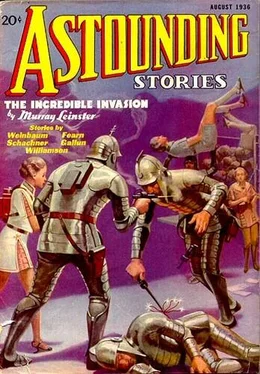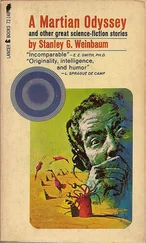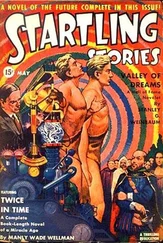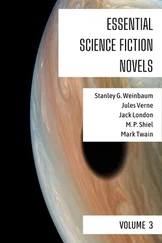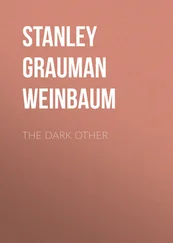Stanley Weinbaum - Proteus Island
Здесь есть возможность читать онлайн «Stanley Weinbaum - Proteus Island» весь текст электронной книги совершенно бесплатно (целиком полную версию без сокращений). В некоторых случаях можно слушать аудио, скачать через торрент в формате fb2 и присутствует краткое содержание. Жанр: Фантастика и фэнтези, на английском языке. Описание произведения, (предисловие) а так же отзывы посетителей доступны на портале библиотеки ЛибКат.
- Название:Proteus Island
- Автор:
- Жанр:
- Год:неизвестен
- ISBN:нет данных
- Рейтинг книги:3 / 5. Голосов: 1
-
Избранное:Добавить в избранное
- Отзывы:
-
Ваша оценка:
- 60
- 1
- 2
- 3
- 4
- 5
Proteus Island: краткое содержание, описание и аннотация
Предлагаем к чтению аннотацию, описание, краткое содержание или предисловие (зависит от того, что написал сам автор книги «Proteus Island»). Если вы не нашли необходимую информацию о книге — напишите в комментариях, мы постараемся отыскать её.
Proteus Island — читать онлайн бесплатно полную книгу (весь текст) целиком
Ниже представлен текст книги, разбитый по страницам. Система сохранения места последней прочитанной страницы, позволяет с удобством читать онлайн бесплатно книгу «Proteus Island», без необходимости каждый раз заново искать на чём Вы остановились. Поставьте закладку, и сможете в любой момент перейти на страницу, на которой закончили чтение.
Интервал:
Закладка:
Proteus Island
by Stanley G. Weinbaum
The brown Maori in the bow of the outrigger stared hard at Austin Island slowly swimming nearer; then he twisted to fix his anxious brown eyes on Carver. "Taboo!" he exclaimed. "Taboo! Aussitan taboo!"
Carver regarded him without change of expression. He lifted his gaze to the island. With an air of sullen brooding the Maori returned to his stroke. The second Polynesian threw the zoologist a pleading look.
"Taboo," he said. " Aussitan taboo!"
The white man studied him briefly, but said nothing. The soft brown eyes fell and the two bent to their work. But as Carver stared eagerly shoreward there was a mute, significant exchange between the natives.
The proa slid over green combers toward the foam-skirted island, then began to sheer off as if reluctant to approach. Carver's jaw squared. " Malloa! Put in, you chocolate pig. Put in, do you hear?"
He looked again at the land. Austin Island was not traditionally sacred, but these natives had a fear of it for some reason. It was not the concern of a zoologist to discover why. The island was uninhabited and had been charted only recently. He noted the fern forests ahead, like those of New Zealand, the Kauri pine and dammar — dark wood hills, a curve of white beach, and between them a moving dot — an apteryx mantelli , thought Carver — a kiwi.
The proa worked cautiously shoreward.
"Taboo," Malloa kept whispering. "Him plenty bunyip! "
"Hope there is," the white man grunted. "I'd hate to go back to Jameson and the others at Macquarie without at least one little bunyip , or anyway a ghost of a fairy." He grinned. " Bunyip Carveris . Not bad, eh? Look good in natural-history books with pictures."
On the approaching beach the kiwi scuttled for the forest — if it was a kiwi after all. It looked queer, somehow, and Carver squinted after it. Of course, it had to be an apteryx ; these islands of the New Zealand group were too deficient in fauna for it to be anything else. One variety of dog, one sort of rat, and two species of bat — that covered the mammalian life of New Zealand.
Of course, there were the imported cats, pigs and rabbits that ran wild on the North and Middle Islands, but not here. Not on the Aucklands, not on Macquarie, least of all here on Austin, out in the lonely sea between Macquarie and the desolate Balleny Islands, far down on the edge of Antarctica. No; the scuttling dot must have been a kiwi.
The craft grounded. Kolu, in the bow, leaped like a brown flash to the beach and drew the proa above the gentle inwash of the waves. Carver stood up and stepped out, then paused sharply at a moan from Malloa in the stern.
"See!" he gulped. "The trees, wahi! The bunyip trees!"
Carver followed his pointing figure. The trees — what about them? There they were beyond the beach as they had fringed the sands of Macquarie and of the Aucklands. Then he frowned. He was no botanist; that was Halburton's field, back with Jameson and the Fortune at Macquarie Island. He was a zoologist, aware only generally of the variations of flora. Yet he frowned.
The trees were vaguely queer. In the distance they had resembled the giant ferns and towering kauri pine that one would expect. Yet here, close at hand, they had a different aspect — not a markedly different one, it is true, but none the less, a strangeness. The kauri pines were not exactly kauri, nor were the tree ferns quite the same Cryptogamia that flourished on the Aucklands and Macquarie. Of course, those islands were many miles away to the north, and certain local variations might be expected. All the same —
"Mutants," he muttered, frowning. "Tends to substantiate Darwin's isolation theories. I'll have to take a couple of specimens back to Halburton."
" Wahi ," said Kolu nervously, "we go back now?"
"Now!" exploded Carver. "We just got here! Do you think we came all the way from Macquarie for one look? We stay here a day or two, so I have a chance to take a look at this place's animal life. What's the matter, anyway?"
"The trees, wahi! " wailed Malloa. " Bunyip! — the walking trees, the talking trees!"
"Bah! Walking and talking, eh?" He seized a stone from the pebbled beach and sent it spinning into the nearest mass of dusky green. "Let's hear 'em say a few cuss words, then."
The stone tore through leaves and creepers, and the gentle crash died into motionless silence. Or not entirely motionless; for a moment something dark and tiny fluttered there, and then soared briefly into black silhouette against the sky. It was small as a sparrow, but bat-like, with membranous wings. Yet Carver stared at it amazed, for it trailed a twelve-inch tail, thin as a pencil, but certainly an appendage no normal bat ought to possess.
For a moment or two the creature fluttered awkwardly in the sunlight, its strange tail lashing, and then it swooped again into the dusk of the forest whence his missile had frightened it. There was only an echo of its wild, shrill cry remaining, something that sounded like " Wheer! Whe-e-e-r! "
"What the devil!" said Carver. "There are two species of Chiroptera in New Zealand and neighboring islands, and that was neither of them! No bat has a tail like that!"
Kolu and Malloa were wailing in chorus. The creature had been too small to induce outright panic, but it had flashed against the sky with a sinister appearance of abnormality. It was a monstrosity, an aberration, and the minds of Polynesians were not such as to face unknown strangeness without fear. Nor for that matter, reflected Carver, were the minds of whites; he shrugged away a queer feeling of apprehension. It would be sheer stupidity to permit the fears of Kolu and Malloa to influence a perfectly sane zoologist.
"Shut up!" he snapped. "We'll have to trap that fellow, or one of his cousins. I'll want a specimen of his tribe. Rhimolophidae, I'll bet a trade dollar, but a brand-new species. We'll net one tonight."
The voices of the two brown islanders rose in terror. Carver cut in sharply on the protests and expostulations and fragmentary descriptions of the horrors of bunyips, walking and talking trees, and the bat-winged spirits of evil.
"Come on," he said gruffly. "Turn out the stuff in the proa. I'll look along the beach for a stream of fresh water. Mawson reported water on the north side of the island."
Malloa and Kolu were muttering as he turned away. Before him the beach stretched white in the late afternoon sun; at his left rolled the blue Pacific and at his right slumbered the strange, dark, dusky quarter; he noted curiously the all but infinite variety of the vegetable forms, marveling that there was scarcely a tree or shrub that he could identify with any variety common on Macquarie or the Aucklands, or far-away New Zealand. But, of course, he mused, he was no botanist.
Anyway, remote islands often produced their own particular varieties of flora and fauna. That was part of Darwin's original evolution theory, this idea of isolation. Look at Mauritius and its dodo, and the Galapagos turtles, or for that matter, the kiwi of New Zealand, or the gigantic, extinct moa. And yet — he frowned over the thought — one never found an island that was entirely covered by its own unique forms of plant life. Windblown seeds of ocean borne debris always caused an interchange of vegetation among islands; birds carried seeds clinging to their feathers, and even the occasional human visitors aided in the exchange.
Besides, a careful observer like Mawson in 1911 would certainly have reported the peculiarities of Austin Island. He hadn't; nor, for that matter, had the whalers, who touched here at intervals as they headed into the antarctic, brought back any reports. Of course, whalers had become very rare of late years; it might have been a decade or more since one had made anchorage at Austin. Yet what change could have occurred in ten or fifteen years?
Читать дальшеИнтервал:
Закладка:
Похожие книги на «Proteus Island»
Представляем Вашему вниманию похожие книги на «Proteus Island» списком для выбора. Мы отобрали схожую по названию и смыслу литературу в надежде предоставить читателям больше вариантов отыскать новые, интересные, ещё непрочитанные произведения.
Обсуждение, отзывы о книге «Proteus Island» и просто собственные мнения читателей. Оставьте ваши комментарии, напишите, что Вы думаете о произведении, его смысле или главных героях. Укажите что конкретно понравилось, а что нет, и почему Вы так считаете.
